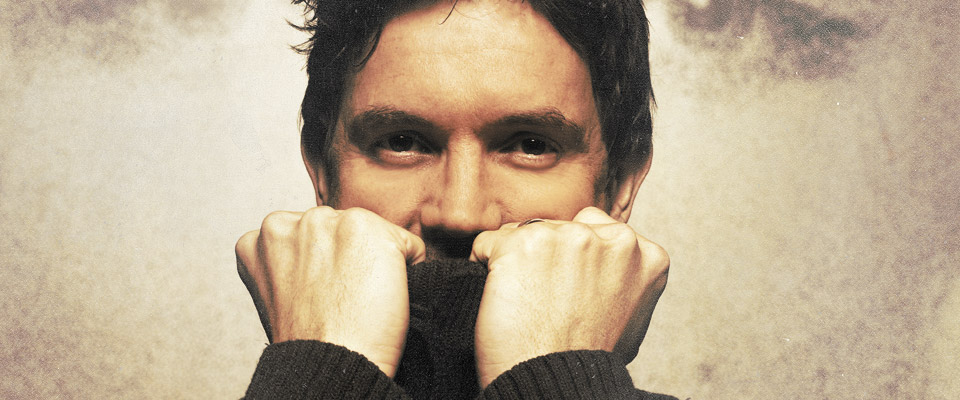Gus MacGregor Biography

An artist worth becoming evangelical about.
In an era when manufactured pop is thought to be the height of creative ambition, the singer/songwriter is considered something of an anachronism. Once in a while, however, you stumble across an artist who makes you remember why you liked music in the first place. Enter Gus MacGregor and an artist worth becoming evangelical about. Born in Blackpool and signed to the Toronto-based FOD Records, MacGregor initially found success on a London stage starring as Buddy in The Buddy Holly Story. An Olivier Award nomination swiftly followed – for Best Actor In A Musical – but so did self-doubt and a desire to get arrested for busking on the tube. Indeed, MacGregor has said “I think singing in the street is much harder than playing to a packed theatre or concert hall. I think every performer should do it from time to time. It keeps your feet on the ground and exposes your weaknesses in a way that a warm, comfortable auditorium can not.” Of course, this would only warrant a doodle on the street map of pop unless Gus MacGregor wasn’t such a hugely gifted talent – but he is and it won’t be. With a voice like melting butter, MacGregor comes across like a young Paul Simon (yes he’s that good) whilst Gus Macgregor – the eponymous debut album produced by the legendary Bob Rose (Roy Orbison, George Harrison) – has an instant, classic feel, like something you’ve had knocking around the house for years. It’s enough to make you weak.
As a child MacGregor was exposed to Irish, Scottish and English folk music, as well as the American folk artists of the 60’s and 70’s. “My dad had some sea shanties, a blue boxed Beatles set and a lot of Joan Baez and Jackson Brown”, he says. Indeed it was a mixed musical education as MacGregor grew up to love blues and country and, subsequently, early Alan Lomax recordings or “music recorded by working people who weren’t interested in a career.”  Tellingly, he noticed a parallel between Scottish music about whalers and the 40s and 50s Lomax recordings of the deep south. Paradoxically, his elder sisters taught him to play classical guitar and by the age of eleven he was playing guitar in his bedroom in lieu of schoolwork. Four years later MacGregor was playing gigs at the Sun Inn in Blackpool and then, at the age of 22, “Buddy Holly The Musical came to town. The cast used to come into the club I played in,” he recalls. “The guy who was playing Buddy was about to leave and he suggested I should try out for the part.” MacGregor had no preconceptions about being an actor but as his father had just died and he felt like nothing really mattered he decided to head down to London and audition. To his amazement he got the part. Overnight his life changed.
Tellingly, he noticed a parallel between Scottish music about whalers and the 40s and 50s Lomax recordings of the deep south. Paradoxically, his elder sisters taught him to play classical guitar and by the age of eleven he was playing guitar in his bedroom in lieu of schoolwork. Four years later MacGregor was playing gigs at the Sun Inn in Blackpool and then, at the age of 22, “Buddy Holly The Musical came to town. The cast used to come into the club I played in,” he recalls. “The guy who was playing Buddy was about to leave and he suggested I should try out for the part.” MacGregor had no preconceptions about being an actor but as his father had just died and he felt like nothing really mattered he decided to head down to London and audition. To his amazement he got the part. Overnight his life changed.
For nearly a decade MacGregor used to get up and clean his teeth whilst singing ‘Every day it’s a-gettin’ closer/Goin’ faster than a roller coaster.’ Each night he’d sing for three hours, then, more often than not, have dinner with Lucie Arnaz or some other Hollywood/West End heavyweight. And each night he’d go to bed wondering when he was going to be found out. The sensation lasted even until the night of the Olivier Awards when MacGregor thought himself “an imposter, surrounded by proper actors.” But he loved Buddy Holly. “His songs were a landscape to people’s lives,” he says now. “And his music was in your face and charged with sexual innuendo!” MacGregor even identified with him – after all he was a singer/songwriter who didn’t fit in – but after eight years he knew he had to move on. MacGregor met a girl – a ballet dancer called Jenny who was to become his wife – and moved to Switzerland.
Some of you might be thinking – so where did it all go right? But you’d be wrong. MacGregor took to busking, sleeping on airport floors and train and bus platforms. Indeed he says of this period in his life: “I was like an old hobo. My diary was just filled with confirmation numbers for trains and planes and buses. I would travel anywhere for a gig, play a folk club in Bournemouth then spend seven hours on a coach to Nottingham.” He loved busking, noting that when he played one of his songs in the street he could tell whether it was any good or not. He was playing a George Harrison song on the street in Bern one day when a guy who’d been watching him pulled out a police badge and he was booked for not having a license.
Somehow MacGregor’s musings found their way to Universal Music who suggested he co-write with Judy Tzuke (he did and they produced several songs together) and a new-found confidence enabled him to write and record an album (for FOD) that would end up being his eponymous debut. The record is astonishing for several reasons, not least because you wouldn’t expect someone to step off a West End stage and produce a record so thrillingly thought provoking. MacGregor reveals that, as a teenager he was given three records that he still owns to this day – Terry Reid’s Seed Of Memory, Jackson Browne’s Late For The Sky and The Paul Simon Songbook and the latter’s influence is apparent on the album’s second track, Crown Of Thorns, which offers the line “if I offered you some wine for forgiveness, would you lay down your crown of thorns?” (Of Simon, he says, “I love his turn of phrase and his use of melody which doesn’t fight the natural melody of speech.”) The song is about the possibility of reconciliation with an old flame and MacGregor admits that it specifically concerns someone he was unfaithful to. “I think I slightly crave her forgiveness even now,” he says. “The song is about wanting to be a better person than I am but it also wonders what life would have been like if the relationship had worked and whether we look back and glorify the past.”
Reconciliation is a common theme on Gus MacGregor but then again so is ..what if? I Once Imagined Us concerns a relationship that is inevitably going to fail but it also asks whether life was really like that or whether you just imagined it. MacGregor remembers taking his girlfriend out in his first car and the sentiments are relayed in heartbreaking detail when he sings:  “Now this old Vauxhall has seen better days/ But the radio still works quite well/ And if I tune it just enough/ Between the static and the engine buzz/I can still imagine us.” It’s a realistic song but hardly bleaker than the Roy Orbison-tinged For Better Or For Worse” which appears to be about whether it is possible to survive a relationship at all – “Love’s a thing you do you know, it’s never been a thing that you can say.” Here, it’s interesting to note that MacGregor seems to be writing about a relationship of the future and then imagining looking back on that relationship’s demise ….
“Now this old Vauxhall has seen better days/ But the radio still works quite well/ And if I tune it just enough/ Between the static and the engine buzz/I can still imagine us.” It’s a realistic song but hardly bleaker than the Roy Orbison-tinged For Better Or For Worse” which appears to be about whether it is possible to survive a relationship at all – “Love’s a thing you do you know, it’s never been a thing that you can say.” Here, it’s interesting to note that MacGregor seems to be writing about a relationship of the future and then imagining looking back on that relationship’s demise ….
Elsewhere Gus MacGregor remains enigmatic. The magnificent Under The Sun (featuring the delicious line “We follow our happy noses”) suggests that contentment can be found by sharing your life with someone else; the panoramic Lifeline, reminiscent of The Eagles’ finer moments, is a painting of a struggling relationship where two lovers put their oldest jeans on and head for the nearest bar – whilst angels save them before they “hit the ground”; Rings Around The Moon (which cleverly employs numerical imagery throughout) is about spending time apart from the person you love – and the transience of happiness; My Two Feet is about, ahem, keeping your feet on the floor and not taking things too seriously; and Sarah touches on a common malaise, wondering whether we can ever really know the other person we are living with.
Three tracks on Gus MacGregor are specifically about childhood and growing up: the Dylan-esque Rain To Rainbows (a song worth clinging to) features turns of phrase MacGregor wishes his father had said to him and which he would love to say to the son he’s yet to have – “When you see no ships only hardships /May the sun turn the rain to rainbows in your sky/ May the wind dry the tears from your eyes”; the evocative Before The Unions Fell transports us back to an era that coincided (in MacGregor’s case) with a miner’s strike and getting into trouble; and best of all is Swallows And Amazons. The Arthur Ransome book (in which children sail, fish and make camp on an island in the Lake District) of the same name transfixed and touched MacGregor as a child and even now he envies these children and their imaginary world. Typically, the song is tinged with the sadness of a relationship ending before a family can enjoy such frivolity.
Gus MacGregor closes with I Bet You Wished You Listened To Me Now, an acapella vignette that suggests that it is better to listen to people than in it is to suppress their voices. It was partly inspired by the speeches of Nelson Mandela – MacGregor and producer Rose discussed setting the piece to music before deciding that its cold, stark message should be heard in absentia. It’s an entirely appropriate comment on the value of the freedom of speech and a fitting coda to an extraordinary record, one that will sit proudly in any collection for many years to come. And for us, and more importantly for MacGregor himself, it’s been worth the wait. Or as the man himself says on Lifeline:
“Life is no rehearsal. Honey, this is it.”
















